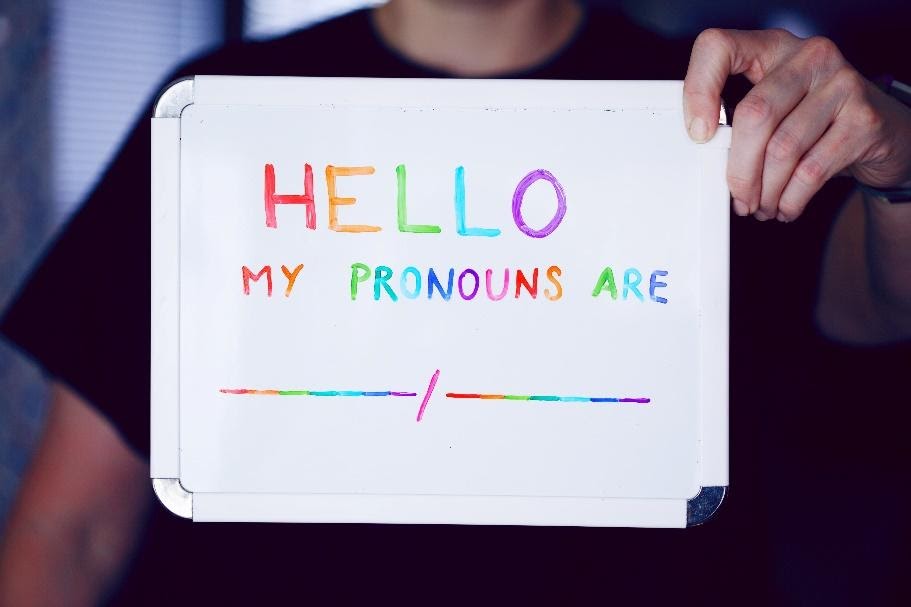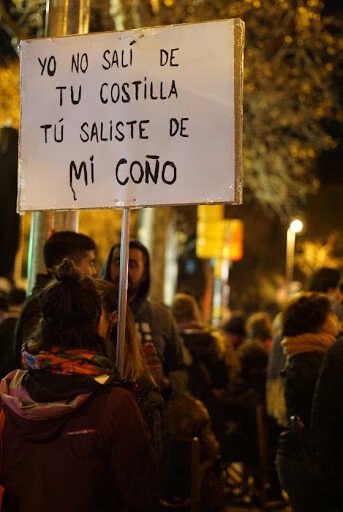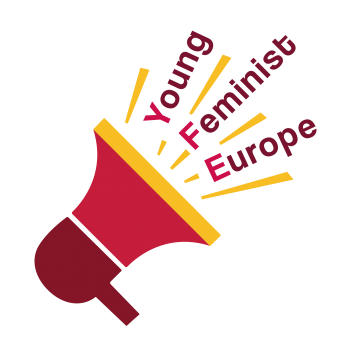Language does not always include everyone in its narrative, so can we use it to address issues that concern women, if by default they don’t exist in this language? A heated debate about gender-inclusive language is flaring up in Germany and other countries, with major pushback.
As a European country of power, Germany is in deep trouble.
The country is preparing for its national elections in September 2021 and political parties are trying to catch voters by exploiting a deep-rooted debate about gender-inclusive language. In a recent interview with Spiegel, Christoph Ploß, who is a member of the parliament for the Christian Democratic Union (CDU), said, “Gender-inclusive language should be forbidden in public institutions such as schools, universities and public authorities.”
This polemic statement has hit a nerve. Intersectional feminists have been advocating for a gender-inclusive language, albeit with major pushback from very conservative counterparts and even from the general population. In discussions amongst feminist groups, some urge for an adjustment of language, whereas others say that improving women’s lives in a patriarchy should come first rather than focusing on semantics. But the discussion becomes more pressing across many other countries within Europe, especially in Spain and France.
Language Use in Spain: Conversations on Gender Exclusivity
A great example is the Spanish use of todos for all. Whereas all simply includes everyone in the English language, the Spanish language uses the endings “todos” for describing a male collective and the ending “todas” to describe a female collective. However, as soon as a man joins an all-women group, todas is converted to todos, such that the feminine determiner vanishes from the radar. A simple email starting with “hello all” (“hola todos”) is therefore already a problem, because it excludes by default all women present in this group. To avoid this, some people have started using todxs, tod@s or todes to reflect a neutral plural. Yet there is no consensus – most of the Spanish population still find it hard to adapt their language, especially when pronouncing something as difficult as “todxs.”
It is worth following the dialogue on the use of language even for English speakers, in order to expose ourselves to linguistic patterns and challenge our own exclusiveness.
But the problem does not stop at the use of todos. Digging deeper, it becomes clear that a one-sided use of masculine determiners is deeply ingrained in Spanish culture. If a couple wants to say that they are worried about their child, they may say, “Estamos preocupados por nuestros hijos (we are worried about our children).” Semantically, the couple and the children assume a masculine identity, even if women are included in the group.
It is worth following the dialogue on the use of language even for English speakers, in order to expose ourselves to linguistic patterns and challenge our own exclusiveness. This debate is connected to all groups of our societies, and it provokes the question on how to adapt our semantics to reflect the change we see in the world.

Language Use in Germany: A Direct Reflection of Society
Linguistic debates are not new, especially within Germany. In the early 2000s, an outcry reverberated through the country: the increased use of anglicisms was viewed as a threat and had the potential to “ruin” the German language. Denglish was the name of the overpowering enemy. Change seemed inevitable then, yet talk shows were filled with English-illiterate speakers who discussed how Goethe’s language was dying. However, language is in a constant state of change, which meant that the Germans adapted and ensured the survival of Goethe’s language.
we should start by acknowledging that many of our words are already gendered from a male perspective.
In the same way that German society had adapted its language based on social fears and contexts in the early 21st Century, it has similarly proven to have changed its linguistic patterns in recent years. When Angela Merkel was elected Chancellor in 2005, Germany had to invent a new word because the female word for Kanzler (or “Chancellor”) did not exist. It is very telling that even though many professions in German have a female and male version, “Chancellor” was not one of them. Ultimately, when new terms are introduced and old words changed or eliminated, it is a sign that the old terms no longer fit the society that we want to live in.
Can Small Changes Create Gender-Inclusive Language?
The arguments against a gender-inclusive language are not directed against linguistic or grammatical adjustments. Instead, they question the difference that would be made with the alteration or replacement of a word that expresses equality.
However, we should start by acknowledging that many of our words are already gendered from a male perspective. This will make it easier for us to identify terms that should be replaced, such as “businessmen” or “mankind.” Every language is different, so there is no one-fits-all solution, but we can start by analysing the use of male or female professions, going over pronouns, looking at gendered adverbs, and using “they” instead of him or her. By creating this consciousness, we may also come across other terms even beyond the gender binary that are no longer up to date. This will give us a chance to also eliminate defamatory and discriminative misnomers, such as outdated terms for people with disabilities or BIPOC. It will likely take a long time until such adjustments are widely adopted; however, if a wider range of media outlets adapt a more gender-inclusive language to create more awareness, the rest should fall into place.
Gender-Inclusive Language as the Minimum Requirement for an Equal Society
How can we understand the realities of women’s lives when they are by default not part of the language? Is it possible to talk about stealthing, gender pay gaps, care work and inequalities in general if the female existence is not accounted for in the language we use? In excluding certain gendered experiences from our language, we make these genders and their accompanying problems invisible.
We might not be able to give visibility to all the women who came before us, but we can change the reality for those that are here now and those that come after us.
By taking the debate about language seriously, we can shift the narrative from a male-focussed history, which has been mainly told with a male-focussed voice about mostly male protagonists, towards creating room for diverse stories and the manifold achievements of women in this century. We might not be able to give visibility to all the women who came before us, but we can change the reality for those that are here now and those that come after us.

The debate about gender-neutral language is emotional because it is more than a language adjustment. When speaking about the modification of our language, we must confront ourselves with the reality that we may not be as inclusive as we think we are, and that our society is not as equal as we wish it were.
We might still struggle to fight subconscious structures and models that are ingrained in our heads, and we might even feel that the change in language is scary as it is challenging the status quo that we may find comforting. However, just like the 2000s Denglish controversy in Germany, an evolution of our language reflects and follows the advancement of society. Many Germans, who were once against using English, have now come to embrace it in their colloquial language; this only shows the capability of society to embrace change and progress.
In fact, even my German grandmother has accepted the word “cool” and uses it frequently, as if it had been part of her vernacular all her life.


![When is rape recognized as rape? The case of Germany – Wann ist eine Vergewaltigung eine Vergewaltigung? Der Fall Deutschland [EN/DE]](https://usercontent.one/wp/www.youngfeminist.eu/wp-content/uploads/2015/11/il_fullxfull.971261048_pxwu_grande-150x150.jpg?media=1744965719)

![What are the roles of Polish women in politics? – Jakie role pełnią kobiety w polskiej polityce? [EN/PL]](https://usercontent.one/wp/www.youngfeminist.eu/wp-content/uploads/2016/03/women-politics-150x150.jpg?media=1744965719)
Hey Saskia, thank you for the nice article!
A few questions and comments:
1. Would BPoC not be a better term when talking about Europe than BIPoC – since Europeans are the Indigenous people in Europe?
2. “whereas others say that improving women’s lives in a patriarchy should come first rather than focusing on semantics”?
– what are your thoughts on this? Personally, I think changing the language is just fixing the symptom. While language may have some influence on our thought process, reality has a far bigger impact on language and how language is understood. What I understand when hearing words is influenced by the reality I know. An example would be ‘los jefes’ (I started to learn Spanish recently). If the picture that comes up in my mind is compromised more of male or female persons is determined by my experience so far. Being the most bosses are still male, a male picture shows up. Different with ‘maestros’/’teachers’/’Lehrer’ – when I hear that, the picture in my mind is more diverse, because, in my experience, more women were teachers. So shouldn’t the focus be the improvement of lives and social standing instead?
3. There are studies that show the more gendered a language is, the more unequal man and women are in the given society.
https://www.worldbank.org/en/news/feature/2019/01/24/gendered-languages-may-play-a-role-in-limiting-womens-opportunities-new-research-finds -> article about such a study. Speculation on my part: Since women and men are not completely socially equal yet, ‘outing’ a person by gendering the job description may lead to wage and status loss due to still ingrained misogyny. See also the change from actress to actor independent of gender in the English language. Also, in the former GDR job descriptions always used the male article by default, and women were not as influenced by patriarchal role models when deciding for a job – so if people talked about an electrician, they would not know what gender the electrician had.
4. Personally I would be fine with a generic femininum or preferably, neutrum, since that would split the generic form from any perceived meaning regarding the gender of any designated person.
See this article: https://www.psychologytoday.com/us/blog/culture-conscious/201209/masculine-or-feminine-and-why-it-matters?amp
A neutrum could prevent it, though I am not sure if the objects are described with these adjectives because of their femininum or masculinum or because they are made differently (i.e. Spanish bridges may come from Roman times and lasted a long time, being therefore described as ‘sturdy’). If they are described in that way because of the article, would it not be better to change what is associated with the article (e.g. masculine seen as tender, feminine seen as strong)?
5. At the moment, the idea in German language is not to go for an encompassing neutrum, but to gender language more. Especially in plurals, this leads to rather gender binary constructions ‘Kanzler*innen’, where, while Women receive a pronounced position in the word, non-binary people are merely an afterthought. This is especially prominent in speech, where just a kind of a glottal stop is made after the ‘Kanzler’-part, and non-binary-people have just to live with the attitude that they ‘are meant as well’. Is that fair? Also, feminine words are gendered in a way that still puts the male part first – ‘KanzlER’, wouldn’t a correct feminine form be ‘Kanzlin’ instead of ‘Kanzlerin’
I have to be honest on this one, it provides me no real tangible benefit if language is modified to sound inclusive if no actions are actually taken to improve women’s careers. A lot of the time companies I find will definitely easily hire women but once there promotion chances are limited (esp once you have children). I would like the debate to be focused on this.